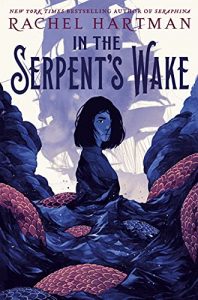Alex Brown Reviews In the Serpent’s Wake by Rachel Hartman
 In the Serpent’s Wake, Rachel Hartman (Random House 978-1-10193-132-5, $18.99, 512pp, hc) February 2022.
In the Serpent’s Wake, Rachel Hartman (Random House 978-1-10193-132-5, $18.99, 512pp, hc) February 2022.
I didn’t plan to fall in love with Rachel Hartman’s Tess of the Road. I went in expecting a light fantasy quest with dragons and ended up with a powerful coming-of-age story about trauma and finding your place in the world. Four years later, we are finally gifted with the sequel, In the Serpent’s Wake, or as I have been calling it, “Tess of the Sea.” Picking up right where we last left Tess, the sequel expands on her personal and physical journeys by filtering them through a lens of anti-colonialism.
At the end of Tess of the Road, Tess had joined up with Countess Marga to find another World Serpent in an attempt to save the life of Pathka, her quigutl friend. When she announced her discovery of an earlier World Serpent, she indirectly contributed to its death. Armed with a vow to Pathka and his offspring Kikiu and a desire to make restitution, she undertakes the unenviable task of trying to find the one resting under the polar seas while also preventing Marga and their competitors, a fleet of dragon scientists, from getting to it first and killing it in the name of science. She’s also joined by Jacomo, a seminary dropout Tess never got along with, but who slowly becomes something more to her as both are changed by their experiences.
Soon the crew are off, sailing south through a sprawling archipelago originally home to countless islander societies and now colonized by the Ninysh. Tess’s half-dragon sister Saint Seraphina (who has her own duology, Seraphina and Shadow Scale, but you don’t need to read those first in order to read this series) has commissioned Tess to spy on the Ninysh on behalf of the Goreddi queen. The Ninysh claim to have ‘‘civilized’’ the islanders, known by the rest of the world as the Pelaguese, although they do not call themselves that. But Tess sees what ‘‘civilized’’ actually means: colonization. Across island after island, the native people are subjugated and pressed into servitude and enslavement, their cultures and spiritual practices suppressed, their environments and villages razed and stripped of resources, their relics and ancestors dug up and put on display like trophies or knick knacks. Those who resist are tortured or executed as rebels and traitors.
What is one teenage girl to do in the face of all that? The easy answer, and the one many young-adult fantasy novels offer, is to overthrow the empire. Tess and a motley crew of outcasts and loners come together to dethrone the Ninysh ruler and install a new, kinder leader who ushers in an age of enlightenment and discovery, or something like that. The difference between those books and this one is that Hartman isn’t interested in reform or revolution but in decolonization and anti-colonialism. What the Ninysh are doing isn’t new, nor is it unique to them (Tess learns other supposedly civilized nations were also born in colonization, albeit the kind not rooted in racism). Toppling the Ninysh empire doesn’t solve the root problem of colonialism; in fact, it would create even more problems as other ‘‘civilized’’ people rush in to fill the power vacuum. No, the answer is for Tess to use her privilege and power to ensure the islanders can make their own choices, and to fight when they tell her to.
Hartman moves beyond just Tess’s third-person point of view. She flashes in on Jacomo, Marga, various islanders, and others, giving readers a wide view of the world. The chronically ill dragon Spira is one of those POVs we spend time with. A much younger and more impressionable version of Tess once teamed up with a boy called Will to hurt Spira in the name of a cruel joke. Now, Tess wants to make amends. Spira, unsurprisingly, is unwilling to forgive and is uninterested in Tess’s pity or charity. Spira has bigger things to deal with, such as figuring out this whole gender identity business, dealing with an unexpected relationship, processing a variety of traumas, and trying to gain at least the acceptance if not the respect of dragon society.
Speaking of gender identity, Hartman does not presume all of the societies in her fantasy world have the same patriarchal, binary rules that real-world Western society does. Her ‘‘civilized’’ societies do, but the people of the islands, the dragons, and the quigutl are another story altogether. We get multiple characters that don’t just not fit into the gender binary, but exist beyond it. They come from cultures where gender is defined entirely differently than we do or even than Tess’s people do. It all ties into the bigger narrative theme of anti-colonialism. What does the world look like when not shaped by imperialistic and capitalistic ideals? As Tess learns, it looks like something full of possibilities and choices.
Folded into all that anti-colonial talk is the resolution, if it can even be called that, of the trauma Tess was working through in her first book. Mild spoilers, but Tess experienced terrible acts, both those that she committed and those that were done to her, and the boy at the heart of them was William of Affle. Will also happens to be Marga’s fiancé. Needless to say, that becomes a source of tension between the two women, as well as between Jacomo and Will (Marga doesn’t know what Will did, Jacomo does, and Will doesn’t know what the consequences of his actions were for Tess). It bleeds into Tess’s feelings toward Marga, who continuously refuses to acknowledge the violence of her colonist friends.
Both women witness the brutality committed on the islanders, but where Tess dives immediately into wanting to help, Marga rationalizes it away. Civilized people don’t brutalize others, therefore there’s nothing brutal about subjugating the islanders, or so Marga thinks. At first, Tess wants to swoop in and save the islanders, as if they were helpless children unable to do anything on their own. She finds out the hard way that that is just another tool of oppression. Marga has her own epiphany of sorts, where she’s faced with the same choice as Tess: be an ally or be an oppressor. Jacomo, meanwhile, plays the part of the civilized man who wanders into the wilderness and is taken in by the kindly tribe to become a spiritual leader (read that sentence with a hefty dose of sarcasm). He thinks he can understand thousands of years of history and culture after a few days ‘‘going native,’’ and, like Tess, learns first-hand how naive and dangerous that thinking is.
Through Tess, Hartman digs into how to be a real ally, when to stand up and when to step aside, when to speak out, and when to shut up and listen. It is about knowing that your role may only be to use your privilege to wrench open the door so that others may step through. It is about acknowledging that being a good ally means you are not the center of the movement.
It took me a month to read In the Serpent’s Wake, not because I struggled to get through it but because I wanted to savor the experience as long as possible. I tasted it a few chapters at a time, letting the characters and the subplots sink into me. Like its predecessor, it’s a novel that deserves to be sat with, to let it gradually reveal its secrets. It is deeper and more critical than you realize, yet also more honest and open than you’d expect. Let Rachel Hartman take you by the hand and guide you down Tess’s road until you find what you didn’t know you were looking for.
Alex Brown is a queer Black librarian and writer. They have written two books on the history of Napa County, California’s marginalized communities. They write about adult and young adult science fiction, fantasy, and horror as well as BIPOC history and librarianship. Diversity, equity, inclusion, and access set the foundation of all their work. Alex lives in Southern California with their pet rats and ever-increasing piles of books.
This review and more like it in the August 2022 issue of Locus.
 While you are here, please take a moment to support Locus with a one-time or recurring donation. We rely on reader donations to keep the magazine and site going, and would like to keep the site paywall free, but WE NEED YOUR FINANCIAL SUPPORT to continue quality coverage of the science fiction and fantasy field.
While you are here, please take a moment to support Locus with a one-time or recurring donation. We rely on reader donations to keep the magazine and site going, and would like to keep the site paywall free, but WE NEED YOUR FINANCIAL SUPPORT to continue quality coverage of the science fiction and fantasy field.
©Locus Magazine. Copyrighted material may not be republished without permission of LSFF.






